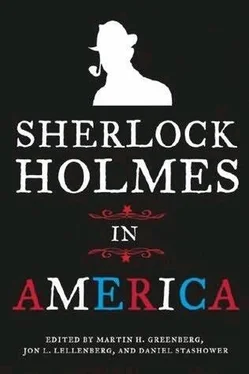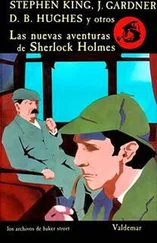“Now, leave us alone while I tell Mr. Holmes about my violin. You all know the story in any case.”
They melted obediently away and this is the story she told us, in a voice as pleasant to hear as the stream flowing beside us.
“As everybody knows, the men in the Alamo were under siege with Santa Anna and his Mexicans camped outside. But for the local people, who knew the old building, there were secret ways in and out. Naturally, our brave defenders wouldn’t use them. But people who were daring enough could get in to the fort, to bring food or nurse the wounded. Some of those daring people were women, and I’m proud to say that one of them was my grandmother on my mother’s side, Marianne. She was only nineteen years old, and one of the defenders was her sweetheart. Five times that brave girl climbed out of her bedroom at night and carried food and water to him in the Alamo. The sixth time, they knew the end must be near. Colonel Crockett himself took Marianne aside and told her she must not come again. I can tell you the very words he said to her, as Marianne told them to my mother, and my mother told them to me. He said, ‘I honor you for what you have done, but in the future, Texas will need its brave wives and mothers. Our duty is to die for Texas and yours is to live for Texas. Go and tell all the ladies that.’”
Mrs. Legrange’s voice faltered. She wiped a tear from her cheek with her gloved finger.
“And the violin?” Holmes said brusquely.
He never did like to see tears. She smiled at him, disregarding his tone.
“Yes, his violin. That was when he gave it to Marianne. Again, I’ll quote his exact words: ‘I don’t suppose there’ll be much occasion for music in here from now on. This violin’s been through a lot with me, but maybe it will enjoy a gentler touch.’ So Marianne took it away with her and it’s been the precious treasure of our family ever since. Here it is.”
She reached into the cushions behind her and brought out a rectangular case, covered in white Morocco leather, tooled with gold. When she undid the gold clasp and opened the lid, we saw a violin and bow nestled in blue velvet. She signaled with her eyes that Holmes was to pick up the violin. He turned it over in his long-fingered hands, carefully as one might handle any musical instrument, but with no particular reverence. It was the copper-red colour of cherrywood and looked to me like the kind of country fiddle you’d expect a frontiersman to possess.
“Nobody has played it since Colonel Crockett,” she said.
When Holmes simply nodded and handed the violin back to her, I caught a shadow of disappointment in her eyes. It was gone in a moment. She put the instrument carefully away and became instantly the gracious hostess, necessarily so because more guests were arriving. It seemed that most of the Daughters of the Republic of Texas and their friends and families had been invited to the picnic to meet Holmes and the grove was soon full of laughing and chattering people. They included Benjamin Barratt and his family and I noticed that Mrs. Legrange paid them particular attention, as if to emphasize to the world that there was no quarrel between them. From the way Barratt looked at her, I guessed there might have been some feeling of tendresse between them a long time ago. If so, it seemed to be replicated by Mr. Barratt’s son Lee, a good-looking military cadet of twenty or so. He was always at Mrs. Legrange’s side or running errands for her. When we left, Lee Barratt was even allowed to carry the precious violin to her landau.
That evening, we had the history of the other violin in the drawing room of the Barratt’s fine home, after dinner. In this case, the instrument was a deep mahogany colour, on display above the marble fireplace in a glass case, with the Texas flag above it and swords with tasseled hilts flanking it on either side. Benjamin Barratt stood on his hearthrug, brandy glass in hand.
“I’m sure you gentlemen know the story. When he knew the case was hopeless, the commanding officer of the defenders, Colonel Travis, offered all his men a free choice: stay with him and die or leave without any reproach from him. Only one man chose to leave. His name was Louis Rose. Travis kept his word and did not reproach him, but the other men were naturally contemptuous. Colonel Crockett could not express his contempt directly, in the face of what Travis had said, so he did it another way. He gave his violin to Rose, with these words: ‘Well, Rose, it seems you’re no soldier after all, so maybe you’d better get practicing so you can make your living with this.’ Rose took the violin, but he knew that San Antonio would be no place for him. My father had a reputation as a charitable man. Rose came to him at dead of night, begging for a loan of money to get away, offering the violin as security. My father gave him the money, on condition that he wrote a statement of how the violin came into his possession. He did so, exactly as I have told it to you. I have the statement in my desk, signed by Rose and witnessed by my father’s servant. I shall show it to you. My father knew the money would never be repaid. We have guarded Colonel Crockett’s violin ever since.”
While Holmes was reading the document, our hostess, Mrs. Barratt, did her best to make polite conversation with me, but she seemed uneasy and kept glancing at the clock on the mantelpiece.
“Please excuse me, but I’m anxious about Lee. Mrs. Legrange was going on after our picnic to visit some friends who have a ranch north of San Pedro Springs. Lee offered to ride with her, which was only right and proper, but he should have been home long ago.”
I wondered whether she was concerned for her son’s safety or the effect of the lady’s charms on the lad. An unworthy thought, as it immediately proved, because a clamour broke out in the hall. We all dashed out, to see Lee, with a bloodied bandage round his head, being supported by two of Mrs. Legrange’s servants. Behind them was Mrs. Legrange herself, tears streaming down her cheeks, trembling like a trapped sparrow.
“It’s my fault, my fault entirely. How can you ever forgive me?”
Barratt took charge of events with efficiency and had a couch made up in the parlour. I offered my services but also suggested sending for the family doctor, as a matter of professional courtesy. He arrived in a short time and confirmed my diagnosis of concussion as a result of two blows to the head with a heavy object, the patient’s life not in danger, but absolute quiet and rest prescribed.
I returned to the drawing room, where Mrs. Legrange was huddled deep in an armchair, taking delicate sips of brandy, and Holmes sitting opposite her.
“Here’s a how-d’you-do, Watson. It appears that some villain has snatched Mrs. Legrange’s violin.”
“The lad Lee kept trying to talk about the violin,” I said.
“It’s all my fault,” Mrs. Legrange said again. “I should never have left him to carry it up. But here at home on my very doorstep, how was I to know?”
Between sobs and sips, she repeated the account for me. The visit to the ranching friends had lasted longer than expected, so it was dusk before she returned to San Antonio, with Lee riding alongside her landau. She’d gone straight upstairs, leaving the coachman to stable both horses and Lee to follow her with the precious violin in its case. Startled by a cry from below, she’d gone back downstairs to find Lee semi-conscious on the pavement and the violin gone.
“The coward had come up behind him. He never even saw his face. Did you ever hear of such villainy? And if poor Lee dies… ”
I assured her that there was no fear of that, provided he was kept quiet.
With Barratt and his wife both occupied by their son, it fell to Holmes and myself to take Mrs. Legrange home in a hack and see her into the care of her housekeeper. Holmes behaved with unexpected courtliness, jumping ahead of me to hand her down from the hack, and even raising her gloved wrist to his lips as we left her in the hall. I smiled to myself, thinking that southern air and manners had made my old friend more susceptible than usual. We walked the short distance back to the hotel.
Читать дальше












